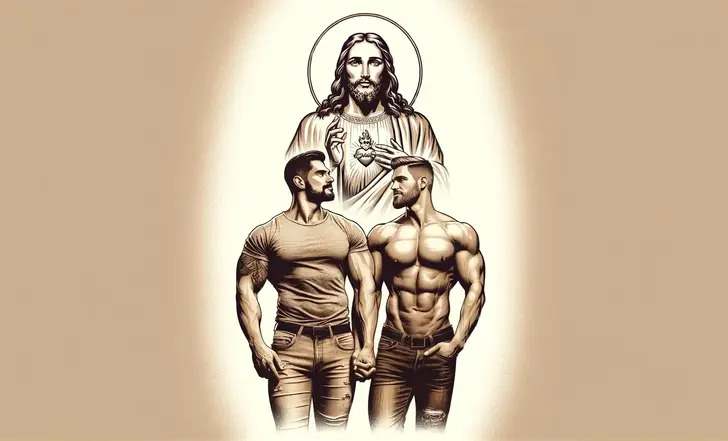Growing up gay in a religious environment is tough. You gradually learn that you're not fitting in, like there's a part of you that’s wrong. You may even deny that you're gay. Then eventually, as you get older, you find peace between your faith and your sexuality. Everyone finds the path of self-acceptance different ways, but it's particularly hard when a religion is involved.
I grew up in a Christian household, where being gay was not openly accepted. I often felt conflicted, torn between my faith and who I truly was. It took years of soul-searching to realize that I could be both a person of faith and a gay man.
Different Perspectives
Religious texts are interpreted in many ways. Some see them as condemnation of homosexuality. Others, like me, see messages of love, acceptance, and understanding.
Talking to religious leaders who are open-minded helped me a lot. They offered different views that didn't always condemn my sexuality. Instead, they emphasized love and happiness. These conversations were enlightening and helped me see that my faith could indeed coexist with my identity.
Did You Know?
[Religions and Same-Sex Relationships]
Christianity
Christianity has diverse interpretations:
- Catholicism: The Catholic Church teaches that homosexual acts are sinful but being homosexual is not. They advocate for chastity for homosexuals.
- Protestantism: Views vary widely. Some denominations, like the United Church of Christ, affirm same-sex relationships, while others, like Southern Baptists, oppose them.
- Orthodox Christianity: Generally opposes same-sex relationships and considers homosexual acts sinful.
Islam
Islam traditionally condemns same-sex relationships and sexual activities between men:
- Quran: Explicitly condemns same-sex acts, citing the story of Sodom and Gomorrah.
- Hadith: Reinforces these views, and many Islamic scholars teach that homosexual acts are haram (forbidden).
Buddhism
Buddhism does not have a single stance, as it emphasizes personal behavior and the avoidance of harm. Traditional teachings discourage sexual misconduct in general, which may include same-sex acts. Whereas many Buddhists nowadays are more accepting.
Hinduism
Hinduism has varied perspectives, and its views can be complex. Some ancient texts like the Manusmriti condemn homosexual acts, while others like the Kamasutra recognize same-sex love. Modern views vary widely though. Many contemporary Hindu are now very supportive.
Other Religions
- Sikhism: Does not explicitly address same-sex relationships. Traditionally many Sikhs oppose same-sex marriage. But modern Sikh groups advocate for LGBTQ+ rights.
- Shinto: Shinto is the indigenous spirituality of Japan, focuses on purity and social harmony, without prohibitions against same-sex relationships. Japanese society is becoming increasingly accepting of LGBTQ+.
- Folk religions: Vary greatly. Animism and Shamanism are inclusive, with some traditions respecting same-sex relationships.
- Taoism: Generally focuses on harmony and balance. It does not explicitly condemn same-sex relationships but emphasizes sexual conduct in the context of natural balance.
- Baha'i Faith: Prohibits homosexual acts and promotes heterosexual marriage as the standard.
- Zoroastrianism: Traditionally views same-sex relationships as contrary to moral order.
- Jainism: Focuses on non-violence and personal behavior. Same-sex relationships are not encouraged traditionally, but modern interpretations can be more inclusive.
My New Family
A lot of my Christian friends rejected me without even asking any question when I came out. Whereas a handful of friends accepted me unconditionally. They said whatever I was, I was who I was. They made me feel I could be myself without fear of judgment. So I can say that finding supportive people within religious groups can be harder, but it's not impossible.
Over time, I made LGBTQ friends in similar situations - who were Christians, Muslims, Hindu, and a lot of Buddhists. We shared our stories and supported each other. The sense of fellowship was comforting, to say the least. They were my new family. At last I knew I wasn't alone. I was so happy to learn that there were others who I can find strength and solidarity together.
Faith and Personal Beliefs
I had to figure out what parts of my faith were most meaningful to me and how they fit with my sexuality. It’s about creating a personal belief system that respects both your faith and who you are.
For instance, I still value prayer, but I also recognize that love is love. It's important for me to practice my faith without denying my identity. It’s a personal path, and everyone finds the way to harmonize their life differently.
Facing Discrimination
Discrimination is a harsh reality for many gay men in religious settings. It takes inner strength and resilience to stand firm in your truth and seek out those who support you. Over time, I learned to let go of the negative voices and focus on positive, affirming ones.
Finding strength also comes from within- believing in your worth and not letting others’ narrow views define you.
Seeking Inclusive Faith Groups
Inclusive faith groups do exist. These are groups that welcome everyone, regardless of their sexuality. Finding such a group can make a huge difference. They provide a space where you can worship and feel accepted for who you are.
I found an inclusive church that welcomed me with open arms. It was a place where I could practice my faith without fear of judgment. This group valued diversity and taught me that love is the core of faith. It was a healing experience that reinforced my belief in the possibility of inclusive spirituality.
Personal Growth
It took me years to fully accept myself and reconcile my faith with my sexuality. This path involves learning, growing, and sometimes unlearning harmful beliefs. Here are some steps that helped me:
- Self-Reflection: Spend time reflecting on your beliefs and how they align with your identity. Journaling can help clarify thoughts and feelings.
- Education: Read books and articles by LGBTQ+ Christians. This can provide new perspectives and affirm your experience.
- Prayer and Meditation: Use prayer and meditation to seek guidance and find peace. It's a way to connect deeply with your faith.
- Therapy: Consider seeing a therapist who understands both LGBTQ+ issues and spirituality. Therapy can provide support and strategies for growth.
- Support Groups: Join LGBTQ+ Christian groups. Sharing experiences with others who understand your path can be incredibly supportive.
Redefining Faith
Redefining faith as a gay Christian man means adapting your beliefs to fit your experiences and identity. This doesn’t mean abandoning your faith but rather reshaping it to fit your life.
- Focus on Love: Emphasize the core Christian message of love and acceptance. Love for yourself and others should be at the heart of your faith.
- Selective Interpretation: Understand that not all scripture is interpreted literally. Focus on passages that support love, kindness, and justice.
- Inclusive Worship: Find or create a worship space that celebrates diversity and inclusivity. This can make your faith practice more fulfilling.
- Dialogue with Leaders: Talk to progressive religious leaders who support LGBTQ+ inclusion. Their perspectives can help you reshape your understanding of faith.
- Service to Others: Engage in acts of kindness and charity. Serving others can reinforce the positive aspects of your faith.
Being a Role Model
Being open about my path helps others who are struggling. By sharing my story, I can be a role model for others facing similar challenges. Here’s how I strive to be a role model:
- Visibility: Be open about your identity and faith. Visibility helps normalize being a gay Christian and can provide inspiration to others.
- Mentoring: Offer to mentor younger LGBTQ+ Christians. Share your experiences and offer guidance based on your journey.
- Advocacy: Advocate for LGBTQ+ inclusion in religious settings. Speak up for policies and practices that promote equality and acceptance.
Moving Forward with Confidence
Moving forward with confidence means living your truth without fear. Today, I walk with my head held high, proud of my faith and my liberal sexual preferences. I no longer see them as conflicting parts of my life but as complementary aspects that make me who I am. It’s a path, but one that’s worth every step.






Since coming out as gay, my family except my supportive sister, hasn't been accepting. Since them I have a wonderful boyfriend and we are planning to wed sometime in the near future. But I won't be able to invite them. Even my sister feels apprehensive about attending due to the tension with other family members.
I know how you feel and my thoughts are with you Mo, you’re surrounded by your new family and more importantly you have your fiancé all the way. Congrats to the new beginning.